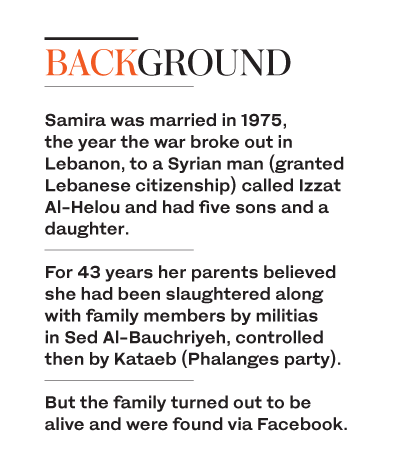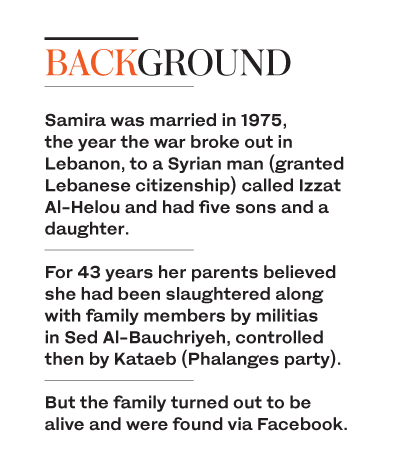BEIRUT: The Lebanese war ended 28 years ago, yet its heinous stories seem to be unfinished, especially those of kidnapped and missing people. There are thought to be around 17,000 kidnapped and missing people, and many families have insisted for decades on keeping these cases alive. But they have rarely had a happy ending like the case of the family of Mohsen Abed Al-Hossein Rida (Farida).
Samira was married in 1975, the year the war broke out in Lebanon, to a Syrian man (granted Lebanese citizenship) called Izzat Al-Helou and had five sons and a daughter.
For 43 years her parents believed she had been slaughtered along with family members by militias in Sed Al-Bauchriyeh, controlled then by Kataeb (Phalanges party).
But the family turned out to be alive and were found via Facebook.
“An unbelievable story,” said former Judge Jamal Al-Helou to Arab News.
This is the story of his sister-in-law. He said: “If it had not happened to me, I would not have believed it.”
Al-Helou recalled the year 1983 when he got married to Zainab Mohsen Abed Al-Hossein Rida. His wife’s civil status record bore her sisters’ names, including Samira and Sarah.
However, her two sisters did not attend their wedding, and when he asked his mother-in-law about the reason, Zainab told him that Sarah had died of illness when she was a baby, and Samira was killed with her family at the beginning of the civil war.
In 1977, when the war paused for a year in Lebanon, Samira’s family went from what was known as West Beirut to East Beirut through the barricades on the demarcation lines, and headed to Sed Al-Bauchriyeh to check whether Samira or any of her children were alive or if they had really died on the notorious day of massacre in Lebanon, known as “Black Saturday.”
When the family asked people in the area about their daughter, they were told that everyone who was in the neighborhood had been slaughtered. The family returned to their home in Beirut, in Khandak Al-Ghamik which turned during the war into demarcation lines, displacing all its residents to surrounding neighborhoods.
Years passed, and peace was restored. Zainab and Samira’s mother died in 2014, and Zainab had nine brothers and two sisters left.
Facebook comment
In 2016, Zainab’s husband, Judge Al-Helou, opened a Facebook account to “contact friends and relatives from the Al-Helou family.” He said two young men from the Al-Helou family, Hussam and Sami, contacted him separately. He said they were polite and that every time he saw their pictures on Facebook, he thought how much his son Mohammed looked like Hussam.
His wife Zainab did not share his interest in Facebook but could not help but notice the similarity between Hussam and her son. However, she was “never intrigued to link this similarity to her sister’s disappearance, given that the case was closed, as Samira’s family accepted her death, even though they had no proof of the family’s death nor their bodies. Thus, their death was not registered in the state records.”
Al-Helou said: “At the time, the war was claiming people daily and there were no phones, transportation means or electricity, and no one cared about papers and documents. The sounds of weapons were louder than anything else.
“A month ago, my son Mohammed got married and I uploaded his pictures on my Facebook account. Hussam posted a comment congratulating my son, and we had a little chat. He told me his mother was Lebanese and his father was Syrian and added that he holds Lebanese nationality from the earlier naturalization processes.
“I asked him about his mother’s birthplace and he told me she was from the south of Lebanon. He did not mention the name of the town. I asked him about her family name and he said ‘Abed Al-Hossein Rida,’ which is my wife’s family name. I asked him about her father’s name and he said ‘Mohsen.’
“This was when I started getting the chills. My wife Zainab was sitting next to me and asked me what was wrong. I did not answer. For a second, I thought someone was either tricking me or I was hallucinating. I kept asking questions and he asked me why I was investigating him and what he was guilty of. I asked him to take a picture of his mother’s civil status record and send it to me. He did and there was the big surprise: Samira Abed Al-Hossein Rida, born on 03-06-1941.”
“I waited for a while then I got my wife’s civil status record. The information matched. I asked him if he had an old identity card of his mother and he did. He sent me a picture of it and I was blown away by the similarity between Zainab and Samira. I sent him a picture of my wife’s civil status record. He read his mother’s name, Samira, married to Izzat Al-Helou and his voice started quivering. He asked me if he could call me because he was not able to write anymore.”
Al-Helou added that when he looked at his wife, it seemed she was about to faint. Zainab told Arab News: “I could not keep it together. Is it possible to find my sister’s children 43 years later? What about Samira? My mother passed away heartbroken. Should I tell my siblings? It was an indescribable moment. Blood was pumping through my veins and I was about to faint.”
Al-Helou said: “When Hussam called me, he was confused, and he had no idea what was happening, even though he read his mother’s name on the civil status record I showed him. He asked me what it meant, and I answered: I am your aunt’s husband, she is next to me, I will pass her the phone.
“They were ‘moments of crying, screaming, happiness and sorrow’ and it was also a moment to try to know what had happened, so I invited him and his brothers to my house for a family gathering,” said Al-Helou.
As they met, it turned out that Samira had died in the same week as her mother in 2014 and had spent her life looking for her parents.
Hussam said that when his parents lived in Sed Al-Bauchriyeh, their neighbor who was from the Al-Zaiter family, from Hermel, was on good terms with the Kataeb party. One of the armed militants urged him to leave the area before night, warning him about the massacre and the killing of all Muslims in the neighborhood.
He gathered his family in his truck and urged his neighbor Izzat Al-Helou to leave with him. “We gathered our stuff and took the coastal road to the north. My family stayed in Tripoli while the Zaiter family headed to Baalbek in the east. We continued to the Lebanese-Syrian border crossing of Al-Arida and went to Tartous, then to Homs, and lived there with my grandparents for years.”
At the time, Samira’s family was displaced from Khandak Al-Ghamik to Sana’ih in Ras Beirut, away from the demarcation lines, and it was hard for Samira and her children to track down her parents, especially as some people in Khandak Al-Ghamik had told her that some of her family had probably died in the bombing and some others had emigrated.
Reconstruction project
Residents of Khandak Al-Ghamik fled the place and were replaced by others; the houses and buildings were destroyed and the whole region was bulldozed and included in the reconstruction project of Beirut’s downtown. Every trace was lost.
Samira’s parents had changed their family name on the civil status record and added “Farida,” the family’s surname in the southern town of Biflieh, said Al-Helou.
He added: “Thus, when Samira’s children asked about their mother’s family in her hometown in the south after her death, as her family members turned out to be alive on the civil status record, they did not ask for the Farida family as they had no idea the name was changed. The truth was lost.”
Ironically, according to Zainab and her husband Jamal Al-Helou, Zainab has a brother living in Germany, and it turned out that her sister Samira also had a son in Germany, in the same town, living one street away from his uncle, and neither of them knew it.
Zainab said she was in a state of shock for three days, and so were her siblings.
“The day I gathered them all in my house, we noticed the similarity between her children and ours, and it turned out my sister had named one of her daughters after our sister Sarah, who died when she was a baby. The heartbreaking part is that my mother passed away without knowing that her daughter was alive, and my sister Samira passed away heartbroken about her family.”
“It is a war story with a happy ending. When I told the news to Wadad Halawani, head of the Committee of the Kidnapped and Missing in Lebanon, she got the chills and said it “gives hope to the hearts of families.” She told us: “A mother has found her son, who went missing in the 1980s, in the war, through the neighbors, but he was mentally incompetent and we have not since documented similar cases.”
She noted that “a number of war victims’ stories ended with the end of the war. They were not documented or scrutinized. The people did not record their experiences due to a lack of awareness about the importance of documentation and had we not documented our kidnapped and missing people, their cause would have faded away.”
She added: “The war ended over 28 years ago and the fate of the missing people and enforced disappearances is still unknown. Since the kidnapping, life has changed, and we no longer live like you or everyone else. We only wait. The suspicion, despair and wait that we live day and night are only treated by certainty. It is our right to know the fate of our families, and it is a fundamental and non-negotiable right.”















